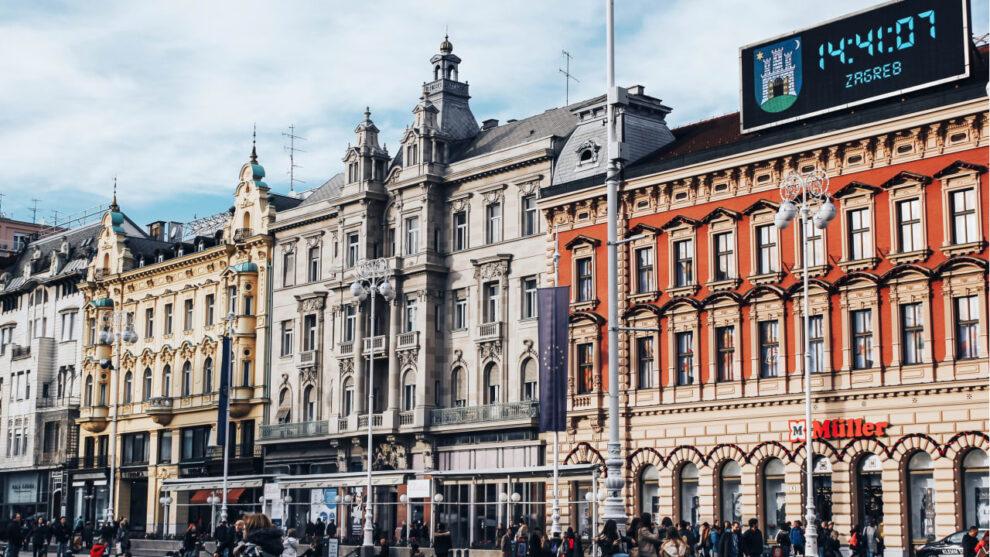Think of European tech powerhouses, and you likely imagine London, Berlin, or somewhere in the Nordics. It’s rare that Croatia would come to mind. But those within the tech sector there believe that it ought to be in the conversation—and that it could well be in 2024.
The country is “punching above its weight,” says Nikola Paveši, director of startups at Infobip, speaking on the sidelines of his company’s conference in the Croatian city of Zadar this fall. Paveši believes that Croatia could soon become as heralded as Estonia or Israel, two countries that are often seen as on the cusp of breaking out into a major player in the global tech sector. As evidence, he points to several metrics: The country has produced two unicorns, Infobip, which provided omnichannel marketing tools, and Rimac Automobili, an electric sports car manufacturer first founded in 2009. “Switch to unicorns per capita, and it makes us in the top five most successful countries,” says Paveši.
Croatia recently had one company acquired by Google for $500 million, and has had a handful of $100 million-plus deals in the last few years. And Infobip—a bootstrapped unicorn, with 80 offices around the world, with clients like Uber, Bolt, Meta, and Coca-Cola—is helping set the scene.
That all points to growing momentum, he says—and potential that can still be achieved. The country’s existing unicorns help incentivize early startups that it’s possible to make it big from within the country’s borders, says Paveši, who believes that Infobip is comparable to what Skype was for Estonia. “What happened in Estonia was that basically out of Skype sprouted all these investment funds, all these other unicorns, and so on,” he says.
Yet, people still don’t know about the tech scene in Croatia, says Paveši. He explains the unicorns, the clients, and the momentum. “Then they go like, ‘Wow, how have I never heard about you guys?’”
In part, that’s because Croatian startups and tech giants haven’t always shouted about their success, says Srdan Kovacevic, cofounder and CEO of ORQA, a Croatian startup developing technology to improve drone vision. “They were focused on doing their work,” he says.
It’s also down to the types of companies that Croatia produces, says Paveši. Most are focused on the business-to-business sector, meaning that their work is often bundled up and packaged to end-users through an entirely different brand’s presence. “You use our products every day,” he says. “Every time you call an Uber, every time you call a Bolt, or every time you get an SMS one-time password from your bank, it’s very likely to use us literally on a daily basis.”
Not shouting about Croatia’s successes has scuppered its startups’ ability to go out and raise money, admits Kovacevic. As have global geopolitical shocks. “I was expecting 2022 to be the year when Croatia has its Skype moment,” he says. There were early talks about IPOs for Croatia’s tech giants, including Infobip. But Russia’s invasion of Ukraine cooled economies, and scared off investment interest. A fundraiser ORQA had scheduled for that year collapsed as investors got cold feet about committing capital to European startups. Instead, the company managed to raise [capital] among local investors. “We’re seeing that [shift] happening,” he says, “but in terms of meaningful change of perspective from the outside in, I don’t think that’s happened yet. And I think it really takes two or three splashy go-public events.”
Those large, public successes are likely to come soon, reckon both Kovacevic and Paveši, because the talent pipeline within Croatia is increasing. That’s because while perceptions may still slowly be changing outside the country about its potential, it already has within it. Kovacevic was old enough to read about the first dot-com boom when he was at university.
“When I was reading about all those, you know, things that were happening, on CNET and elsewhere, that seemed so far away from the reality that we were living that it might as well happen in another galaxy,” he says. “It was impossible for me to even conceive of making that sort of a story from where I was.”
Now, after Croatia joined the EU a decade ago, that’s possible. The infrastructure to develop that tech ecosystem exists. “When I went to Silicon Valley for the first time and saw the Googleplex, I was amazed,” says Paveši. But Croatia now has its own equivalent for Infobip in Zagreb, the nation’s capital, which government delegates visit. Seeing is believing for those politicians, says Paveši, because they’ve become more willing to support the sector—creating a virtuous circle of growth. “We definitely have something to show,” he says. “I think this is a good turning point.” It’s something that energizes Kovacevic too. He’s hopeful that 2024 and beyond will see the macro uncertainties that stymied his company’s fundraising disappear, and new opportunities arise. “I think we’re going to see some big go-public events happening in the next five years,” he says. “And that’s going to be this inflection point where hockey stick growth really starts going up.”
Source : Fast Company































